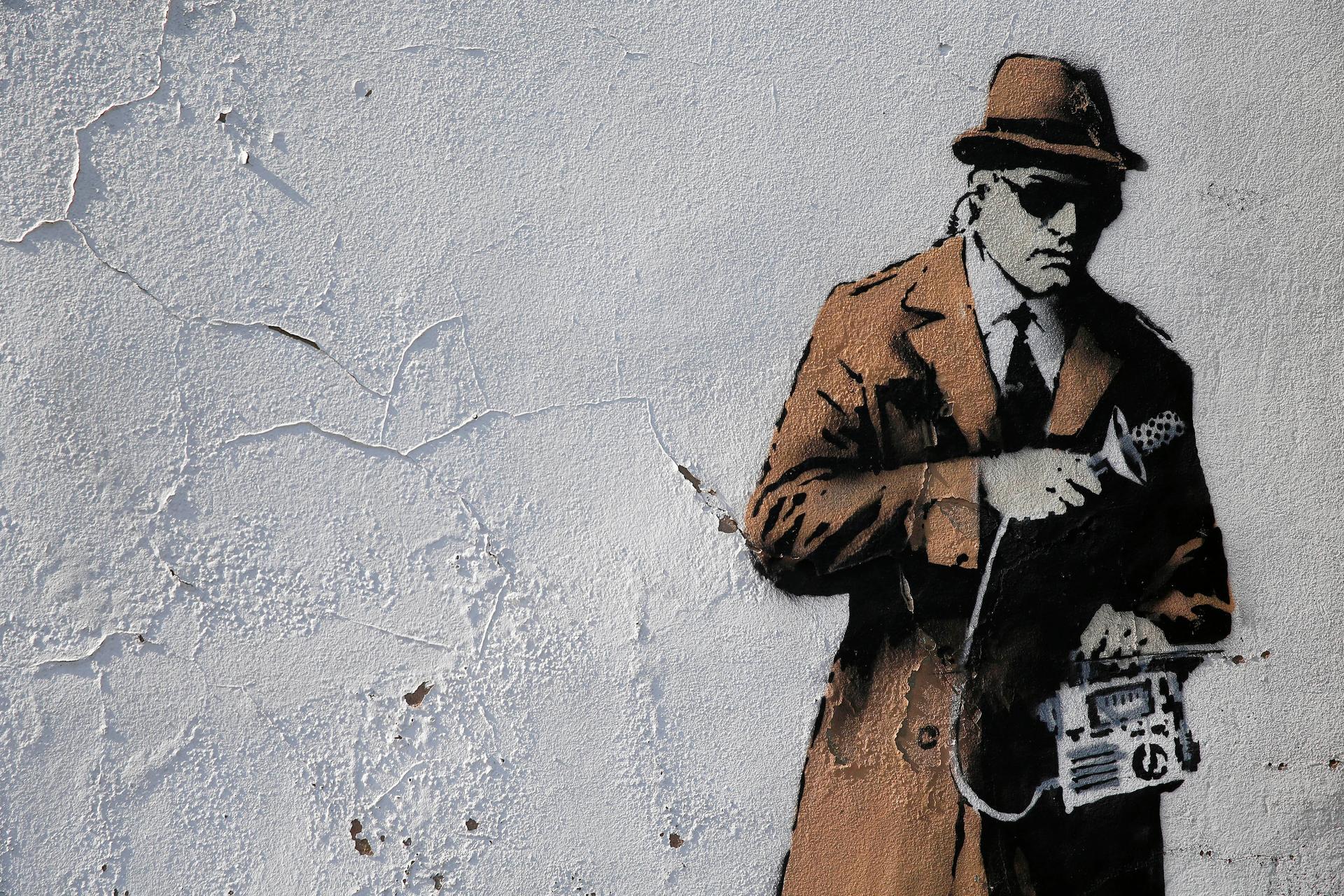The US is reining in internal eavesdropping, but what about spying on the rest of the world?
A detail from graffiti art is seen on a wall near the headquarters of Britain’s eavesdropping agency, Government Communications Headquarters, known as GCHQ, in Cheltenham, western England, April 16, 2014. British media have attributed the new work to acclaimed British street artist Banksy. It’s a spoof about the GCHQ tapping fiber-optic cables carrying international phone and Internet traffic and sharing vast quantities of personal information with the NSA.
Revelations about the National Security Agency's vast surveillance operations have sparked outrage and led to reforms in the US. Not so in Britain, even though British surveillance agencies work closely with the NSA.
Timothy Edgar says it is remarkable what is not being discussed there. Edgar was once President Barack Obama's top advisor on cyber-security and civil liberties and now a visiting fellow at Brown University's Watson Institute.
When he spoke to members of Britain's parliament, he thought he was going to hear about their reforms of surveillance policies. You know, the ones we’ve been talking about in the US. “But really, the complaint was that very little has happened,” he says.
Edgar recently wrote a column for The Guardian about the need for surveillance reform. He spoke to three MPs, one from Britain's three main parties, and all support an overhaul of intelligence services. Edgars says they were curious to hear what reforms the US has been making.
Edgar told them about the US presidential directive to end the bulk collection of metadata. And how the House of Representatives just passed a bill, by a pretty wide margin, to reform surveillance. Obama also set up a website to publish a huge number of declassified documents. “In fact, more documents have been declassified through that website than were actually leaked by Snowden,” he says.
But there were also new revelations this week about the NSA recording every phone call in the Bahamas. So has the US reined in international eavesdropping?
Edgar says that’s the debate we’re just stating to have in the United States. He says the US needs to establish stricter rules on how it spies on foreigners. “In general, Americans kind of shrug their shoulders a little bit about spying on the world,” he says, except for US human rights groups and technology companies.
Human rights groups, according to Edgar, want protections for everyone, not just Americans, and technology companies have a business interest in preserving privacy.
Edgar believes privacy is both a global human right and a human value. But he also respects the need for countries to spy. “I think it is naïve to think we’re going to live in a world in which we get rid of all intelligence activities,” he says. “Or even a world in which we confine them to a few subject matter areas. I think intelligence has a place.”
Even so, Edgar thinks twice now when he uses video chat. He hasn’t yet put a piece of tape over his computer camera, he does think about it. He’s familiar with encryption software and hopes companies will find solutions to better secure our digital world.
Until then, like many of us, he’s doing his best.
Revelations about the National Security Agency's vast surveillance operations have sparked outrage and led to reforms in the US. Not so in Britain, even though British surveillance agencies work closely with the NSA.
Timothy Edgar says it is remarkable what is not being discussed there. Edgar was once President Barack Obama's top advisor on cyber-security and civil liberties and now a visiting fellow at Brown University's Watson Institute.
When he spoke to members of Britain's parliament, he thought he was going to hear about their reforms of surveillance policies. You know, the ones we’ve been talking about in the US. “But really, the complaint was that very little has happened,” he says.
Edgar recently wrote a column for The Guardian about the need for surveillance reform. He spoke to three MPs, one from Britain's three main parties, and all support an overhaul of intelligence services. Edgars says they were curious to hear what reforms the US has been making.
Edgar told them about the US presidential directive to end the bulk collection of metadata. And how the House of Representatives just passed a bill, by a pretty wide margin, to reform surveillance. Obama also set up a website to publish a huge number of declassified documents. “In fact, more documents have been declassified through that website than were actually leaked by Snowden,” he says.
But there were also new revelations this week about the NSA recording every phone call in the Bahamas. So has the US reined in international eavesdropping?
Edgar says that’s the debate we’re just stating to have in the United States. He says the US needs to establish stricter rules on how it spies on foreigners. “In general, Americans kind of shrug their shoulders a little bit about spying on the world,” he says, except for US human rights groups and technology companies.
Human rights groups, according to Edgar, want protections for everyone, not just Americans, and technology companies have a business interest in preserving privacy.
Edgar believes privacy is both a global human right and a human value. But he also respects the need for countries to spy. “I think it is naïve to think we’re going to live in a world in which we get rid of all intelligence activities,” he says. “Or even a world in which we confine them to a few subject matter areas. I think intelligence has a place.”
Even so, Edgar thinks twice now when he uses video chat. He hasn’t yet put a piece of tape over his computer camera, he does think about it. He’s familiar with encryption software and hopes companies will find solutions to better secure our digital world.
Until then, like many of us, he’s doing his best.
